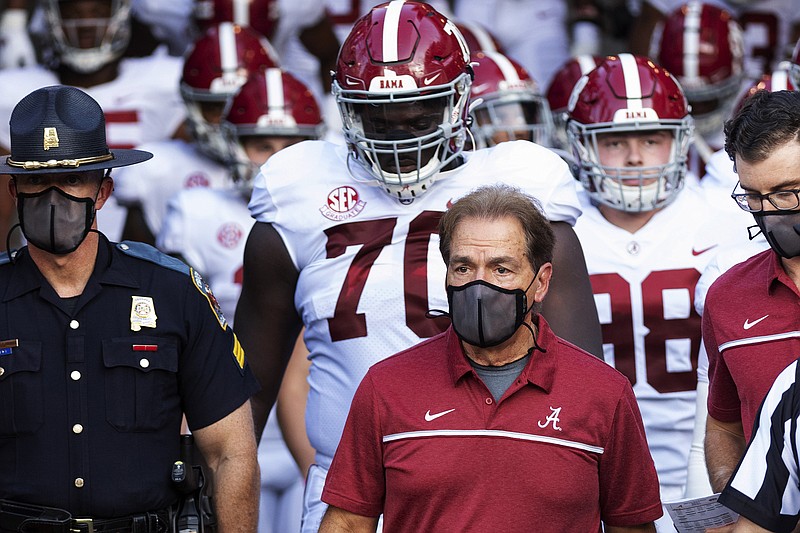How COVID-19 gets our attention
Never mind that Donald Trump and the first lady and the youngest Trump, Barron, have suffered COVID-19.
Now Crimson Tide football Coach Nick Saban has it.
Stop the presses. Southeastern Conference football is being affected. Games are being postponed. This is serious.
Yes, we're being sarcastic.
But the truth is that there still are too many people in this country who aren't taking this novel coronavirus serious. COVID-19 was not a hoax even before whole football teams got sidelined.
But if it takes game-day cancellations to get folks' attention, well, we'll take it.
Last week, Hamilton County cases and hospitalizations climbed again to the highest levels in weeks, prompting the health department to begin testing more people than at any point in the past month and a half.
On Wednesday, the department reported 94 new cases, bringing the county total since March to 10,907. We averaged 82 new cases a day last week. At the beginning of October, we were averaging 61 new cases a day.
Hamilton County Sheriff Jim Hammond, who has said he didn't think masks were all that effective, has tested positive. And Gov. Bill Lee, who has been criticized for sometimes not wearing a mask, is quarantining after being exposed to the virus through a member of his security team who tested positive.
Meanwhile, the Trump administration has indicated it is open to natural herd immunity as a way to best the coronavirus - an option experts say could be disastrous.
The White House embraced a petition titled The Great Barrington Declaration which argues that the virus should be allowed to spread through the population. But it seems it's fake news.
The Daily Beast reports that the declaration's website claims the petition has been signed by more than 15,000 scientists, but last week, Sky News found dozens of fake names on the list of medical signatories, including Dr. I.P. Freely, Dr. Person Fakename, and Dr. Johnny Bananas.
Now who's being sarcastic?
But let's get real, under most estimates, so-called herd immunity would mean about 70% of the population would have to catch the disease.
According to mayoclinic.org, that would translate to more than 200 million people having to recover from COVID-19 to halt the epidemic. As of Friday, Johns Hopkins University of Medicine Coronavirus Resource Center was showing that 8 million have tested positive in our country and more 218,330 had died.
That's a lot of canceled football games.
Follow the money
If money alone decided which political party will win control of Congress, Democrats would already have 2020 in the bag, according to OpenSecrets.org.
The nonprofit Center for Responsive Politics, which operates OpenSecrets, says political financial disclosure reviews through September show Democratic Senate candidates have an unprecedented financial advantage.
Democratic candidates for the Senate have raised more than $300 million more than Republicans, the group said in a news release. Democratic Senate candidates pulled in $726 million to Republicans' $423 million through the end of last month. The cash disparity was even starker in close races where some Democrats amassed twice as much money as their GOP opponents.
Sen. Lindsey Graham, R-South Carolina, tried to cast some doubt on his opponent Jaime Harrison's enormous advantage asking publicly "Where the h-- is all this money coming from?"
Filings show the answer often is small donors. Harrison raised 53% of his campaign funds from donors giving $200 or less, accounting for a whopping $46 million.
In Arizona, Democrat Mark Kelly raised twice as much from small donors as Republican Sen. Martha McSally, bringing in $38 million to her $19 million. In a key North Carolina race, Democrat Cal Cunningham raised 32 percent of his money from small donors, compared to 18 percent for incumbent Republican Sen. Thom Tillis.
What those numbers can't answer, of course, is whether it will make a difference.
But it certainly seems to say something about the mood of the country's voters.
